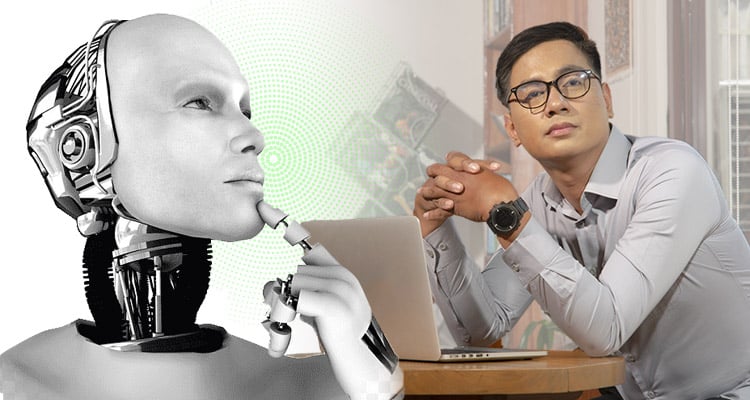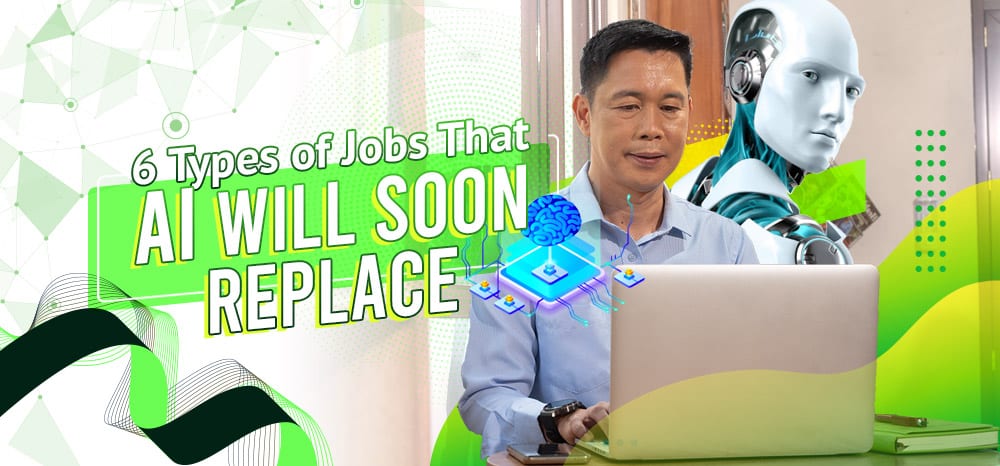The world is rapidly becoming more and more digital. Thanks to modern technology, our lives have become more comfortable and convenient compared to previous generations.
However, not everyone welcomes these changes. As artificial intelligence, or AI, continues to grow and become even more popular today, many workers are beginning to ask: “Will AI replace people in their jobs?”
True, the growth of AI will also lead to new jobs in the long run. And there are several jobs that AI can’t easily replace, such as content writers and graphic designers. But how many other jobs has AI replaced already?
One negative impact of artificial intelligence on employment is job loss. After all, AI is more efficient and precise than people in doing specific tasks. Not to mention AI doesn’t need rest nor pay to do the job.
So, which jobs will AI replace in the future? Let’s find out.

Telemarketers.
A career that is increasingly being replaced by AI is telemarketing. Even today, many AI telemarketers call customers to sell products or services.
One reason for this is that being an excellent telemarketer doesn’t require a high level of emotional, mental, and social intelligence. Sounds harsh, but that is how some companies view this job.
In addition, people rarely purchase products marketed by telemarketers. The success rate of telemarketers depends on whether they’re contacting current or potential customers.
If telemarketers contact existing customers, their average success rate is 12.95 percent. However, their success rate for cold-calling potential customers is only 8.21 percent.
Also, some even find them to be annoying. So much so that someone actually built a robotic answering service specifically for evading telemarketers.

Couriers.
Another set of jobs that AI will replace is courier services.
Because of the pandemic, the courier service sector has increased in popularity alongside online retailing. And with this demand comes the need for increased efficiency on the part of couriers.
Enter AI. By utilizing artificial intelligence in their logistics and supply chain, companies have experienced an increase in efficiency and speed, along with a decrease in expenses.
Route planning apps like Google Maps and Waze are a staple in every courier’s arsenal. And companies have begun using drones for delivering packages.
However, AI still can’t drive and deliver products on its own. It still needs human input. But even this is slowly changing as companies like Tesla are developing self-driving cars.

Customer Service.
Today, chatbots are everywhere. Many companies use them to assist website visitors and solve simple customer problems. Of course, for more complex issues, human customer service specialists are still needed.
But as AI becomes more advanced, a lot of human customer service jobs may soon become obsolete. Advances in AI natural language processing will enable it to simulate human conversations and solve more complex customer problems.
And just like telemarketers, customer service jobs don’t require great social and emotional intelligence. In addition, AI chatbots are available 24/7, unlike human customer services, which may not always be available during holidays or late at night.

Bookkeepers.
Many companies today use AI to do their bookkeeping since it’s far cheaper than hiring a human to do it. Apps like Quickbooks, Freshbooks, and even Microsoft Office all offer automated bookkeeping.
Besides being cheaper than human bookkeepers, AI bookkeepers are more precise and efficient at collecting, storing, and analyzing data. This lessens the risk of human error, especially in big companies with many financial processes to record.

Proofreaders.
Quick question. When was the last time you saw a human proofreader at work? With so much proofreading software available today (some of which are free), proofreaders are rapidly becoming obsolete.
In fact, even Microsoft Word and Google Docs have in-built tools to help writers like me check our work. Plus, one of the most popular writing-assisting tools today is Grammarly.

Market Research Analysts.
A vital part of any company’s marketing strategy is market research. After all, how can a company produce appropriate marketing materials if they don’t know who their target audience is and what they want?
You’d think then that market research analysts would be indispensable to any company, right? Unfortunately, even these jobs will soon be replaced by AI.
AI can be programmed to conduct automated surveys and market research to produce a detailed report faster than a human could.
However, this doesn’t mean that human market research analysts will be replaced by AI. Someone still needs to program it to know which data to analyze and which strategies it needs to implement.

Computers 1, Humans 0?
It’s not easy adapting to new technologies, especially knowing these may take over your job one day. AI has become so advanced that soon, it will replace the jobs discussed above.
If your job is on the list, what should you do? Go looking for a completely different job? Not necessarily.
For one, if you’re an expert in your field, your company won’t let you go just like that. Your expertise honed by years of experience is something AI can never replace. Sp, you could very well be tasked with programming the company’s AI so that it does what it should.
Another way you can adapt is through upskilling. No matter how advanced an AI is, it can only do the task it was programmed to do.
By having a more expansive skillset, you’ll be able to take on more responsibilities, making you more valuable to your boss or company.
So if you’re looking for online job opportunities, Remote Staff is the place to go. Our jobs list has a wide range of jobs you can apply to, so you’ll have plenty to choose from.
So what are you waiting for? Sign up today!

